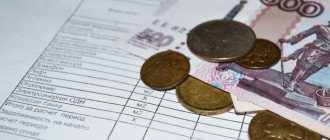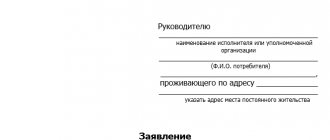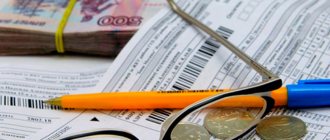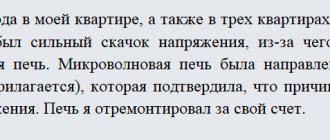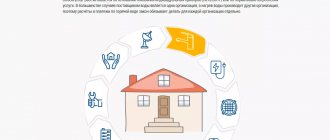Subject to residence, if no one is registered in the apartment, how to calculate the rent? This issue causes difficulties for citizens, since not everyone understands why they regularly pay receipts and why the amount may be increased. Misunderstandings especially often occur if no one is registered in the apartment. Should the owner pay rent for an apartment, register someone in it when there are no such people, and will the rent, in principle, be calculated if no one is registered? These are the questions that need to be answered.
What do housing payments include?
The legislation states that even if there are no residents in an apartment building, delivery is carried out.
Therefore, payments must be generated for each month. What you usually have to pay for:
- house maintenance;
- current and major repairs of common property;
- electricity, water supply, sewage disposal, building heating.
The rent, if you don’t live in an apartment, will still be there. After all, even when the rooms are empty, the high-rise building is heated and provided with the necessities. These costs are shared by all owners and do not depend on the number of registered residents in the area. Therefore, in any case, you will have to pay for utilities, even if no one is registered. It consists of:
- electricity;
- water supply;
- drainage;
- heating;
- supply of domestic gas in cylinders;
- removal of solid waste.
If there are meters and the resource is not used, then the bills will be empty. But when there are no individual metering devices, then payment will be calculated based on the consumption standard for each resident. However, it is worth considering that not all types of payments depend on meter readings.
If there is no meter, you will have to pay for water or gas at regional tariffs. In this case, the fee is formed depending on the number of owners of the premises. These spending innovations came into effect in 2021. The only way to avoid a constant increase in tariff debt is to install an IPU (individual metering device) and pay for the volumes actually consumed.
The legislative framework
Legislation on the procedure for calculating payments for the provision of housing and communal services
The procedure for paying for the maintenance of living space and the use of housing and communal services is based on two codes of Russia: Housing and Civil.
The first determines the system of utility charges, their size and the legal obligations of homeowners.
Based on the second, cases of the emergence of the right to own residential premises are determined, as well as the period from which the obligation to pay for the maintenance of real estate appears.
According to Article 153 of the Housing Code, owners of residential premises are obliged to pay for their maintenance and utilities on time and in full.
In the Housing Code you can find the following:
- what charges are legal (Article 154);
- what payment rules are established by law (Article 155);
- what amount of payment and form is acceptable (Articles 156 - 157);
- what expenses are required to be borne by property owners in apartment buildings (Article 158);
- who can count on what benefits and subsidies when paying for housing and communal services (Articles 159-160).
Questions related to the payment of utility bills in the absence of registered ones in the apartment most often arise among new owners of residential premises, after:
- equity participation in the construction of new housing and before registration of its ownership;
- acquiring or obtaining additional living space in which no one lives;
- moving from old housing and canceling registration in it.
The grounds after which the obligation to maintain real estate passes to the new owner are also described in Article 153:
- the owner is burdened with these obligations from the date of registration of the right indicated in the certificate of ownership of real estate (Civil Code of the Russian Federation, Art. 219);
- employers, from the moment of execution of the rental agreement (Civil Code of the Russian Federation, Chapter 34);
- tenants, from the moment of execution of the lease agreement (Civil Code of the Russian Federation, Chapter 35);
- owners of premises received from developers - after drawing up a transfer and acceptance certificate (Civil Code of the Russian Federation, Art. 556);
- participants of residential cooperatives from the date of provision of the property (RF Housing Code Art. 124).
From the moment the owner of a residential premises moves into it or becomes the owner by law, he is obliged to bear the costs of maintaining the apartment, regardless of whether anyone is registered there or not. It also doesn’t matter whether the premises are residential or temporarily empty.
If the premises are located in an apartment building, the owner is required to pay for the maintenance and repair of common property in the part determined by his share.
Will I have to pay for utilities if I don’t live in the apartment and no one is registered in it?
When a citizen simply lives temporarily in another city, it is enough for him to notify the management company about this every six months and take with him evidence - any documents, tickets or checks that confirm a different place of residence. The obligation to pay for the volumes consumed falls on the one who actually uses the resources. His task is to calculate how many cubic meters or kilowatt-hours were spent, and then enter them into the payment order and transfer the money to the supplier.
When no one lives in the apartment, the accrual for all resources for which there is no IPU occurs according to the number of owners. If there is more than one, it is often not profitable. It is better to register someone in this territory, which will help reduce the amount of payments.
How is rent calculated depending on the number of registered people: what does the calculation depend on if no one is registered?
While the house is being built and not put into operation, the entire burden of payment falls on the developer. After it is accepted by the new owners, the question arises of who will pay the debts and how.
Dimensions and calculations depend on:
- availability of IPU;
- tariffs adopted in the region;
- the area of each individual apartment;
- the number of registered residents.
If the house is rented out under a social tenancy agreement, then the cost is directly dependent on the square footage, and also consists of the costs of repairs, maintenance and possible reconstruction. It is formed within a predetermined maximum value based on the norms established by the authorities.
Does the number of registered people affect the rent? No, in this case the sum of square meters and IPU is important.
The cost of keeping your home clean includes:
- garbage removal;
- beautification of the local area;
- tidying up common household property;
- timely maintenance and repair of communications, attics, basements, and other technical premises.
Public utilities
What are utilities and how are they calculated?
If no one is registered in the apartment, what is the housing and communal services fee? If there are no meters, it is also possible to stop paying for services intended for the convenience of living.
In this case, it is necessary to prove that no one lives in the apartment and, accordingly, does not use the resources. You can do this in several ways:
- Disable resource access to the premises if its owner lives at a different address and no one else lives in the apartment.
- Suspend accruals temporarily for the period of absence, documenting it.
In both cases, you should contact the housing company with an application and a document proving ownership of the property. If the owner of the apartment is registered in another place where he pays for utilities, he should provide a certificate of registration and receipts for payment of resources at the place of residence.
Invoices for garbage removal at the location of the apartment in which no one lives or is registered will be sent automatically.
It is not possible to cancel these accruals upon application. This can only be done by proving that this service is paid for by the citizen in another place, that is, at the place of actual registration.
It is impossible to stop charging for heating and turn it off under any circumstances. The only option to reduce the bill occurs if the heating source is located in the apartment, and it is possible to adjust the heating temperature.
Minimum values will allow you to pay less. Complete shutdown of equipment in winter is impossible, as it will damage the overall heating system and the entire building.
Often, disputes regarding payment for housing and communal services arise during shared construction during a period when the apartment has already been transferred to the owner, but a certificate of ownership has not yet been received. Owners of such apartments should remember that in their case, the law establishes the obligation to pay for the maintenance of the apartment from the moment the property is transferred.
The date of occurrence of obligations is considered to be the date of the transfer deed signed by the apartment owner and the developer. Until this document is signed, the burden of paying for housing and communal services is borne by the developer.
Are counters always profitable?
Owners install individual metering devices in order to bear costs only for actually consumed resources. But this is not always economical.
Calculation of rent for water, if no one is registered in the apartment and there is no IPU, occurs according to the number of owners. Even when there is only one, but in fact there is a family of 5 consumers. In this case, it is profitable to pay the bill, which indicates the standard per person.
When 5-9 residents are registered, but in fact there are 1-2 of them, you can’t do without counting devices. They will help you save significantly, because it is easier to control your own expenses than to prove to the supplying company that the norm is not being spent.
Payment in the absence of IPU
In the absence of individual metering devices, monthly payments are calculated according to the general scheme:
1 average * number of registered.
Average values are calculated individually for each resource - gas, cold and hot water. Gas consumption is calculated separately for rooms where only a gas stove is used and those living spaces where it is needed for heating water or heating. When it comes to water supply, the nuances of ownership may be taken into account. For example, in private homes, cold water tariffs may rise during the summer. This is due to the need to water the land and, as a rule, significantly increase consumption.
How to discharge those who are not in the house
If the rent is calculated based on the number of residents, unnecessary overpayments can be avoided. First you should talk to those who are registered in the living space, but do not actually appear there. Sometimes this helps - the former tenant simply registers at a different address.
But if he refuses to change his registration and does not want to pay rent, then he will have to go to court. The same should be done when the ex-tenant is difficult to find, he moved to another city or disappeared. The only way to solve the problem is to file a statement of claim in court. If the court decision is positive, all that remains is to simply transfer it to the passport office. The defendant must be discharged without his presence.
Other types of payment for housing and communal services
The current legislative norm means that the consumer will not be able to get rid of paying for some utility services.
In particular, we are talking about services such as:
- payment for maintaining the house and surrounding area in proper order;
- janitor and technical staff services;
- payment for intercom, if the apartment has an appropriate communication channel;
- any additional equipment and technical equipment that will be installed on the basis of a joint decision of the owners, documented in the act of the residents’ meeting.
Subsidies
Subsidy issues are regulated by several regulatory documents. The Housing Code and its articles 159 and 160 are of fundamental importance here. The size of the subsidy depends on the established regional standards, which in turn are based on data from Federal indicators.
However, if the consumer has a subsidy, he can still exercise the right to recalculate if the owner was absent for some time and did not use utility resources.
For the current year, the level of cost of housing and communal services for 1 square of housing is, in accordance with the federal standard, 196.23 rubles (for the Moscow region).
In the regions, these values are calculated on a larger scale, so the figures may vary depending on the specific region of the Russian Federation.
People are registered in the apartment, but do not live in it: is it possible to recalculate the amount?
When people are absent for several months, utility debt increases. You can legally protect yourself from fines. To do this, you must submit your application to the Criminal Code or MFC within 30 days of your return. Attach documents that can confirm the information.
Evidence can be provided by the lack of expenditure of light and water - if no one is in the house, then these resources are not wasted. Train or plane tickets, hotel bills and an order to go on a business trip are suitable - any document that proves the citizen’s location at another address.
We looked at whether the size of the rent depends on the number of registered and the number of people living and talked about the features of its calculation depending on the number of registered people. You can refuse some services, others will help reduce the running meter, and some expenses will remain unchanged. If you have any questions, you can contact the supplier, ask for clarification, or try to negotiate a change in conditions.
Where to go for recalculation
If the consumer has a need to adjust data on the actual level of consumed resources, he will have to visit the management company, housing office or other authority charged with charging for utility services.
All changes to payment documentation must be made within 5 days from the date of application. However, before this, the applicant will need to write a corresponding application for recalculation and provide a number of documentation.
Let us note one important nuance. An application for recalculation is submitted no later than 30 days after the end of the period of absence of the consumer.
Necessity
Residents of multi-apartment buildings are required to pay for utilities, which include:
- electricity bill . For residents, it is calculated based on meter readings or an average;
- use of electricity in common areas (hallways). Residents share this payment equally;
- payments for hot and cold water . In this case, the hot water indicator should not be lower than +40 degrees. Payment for preliminary water purification is also charged. Calculations are made using the average or meter data;
- heating fee, the indicator of which should not be lower than + 18 degrees. The calculation of the payment amount depends on the area of the apartment and amounts to 43 rubles per 1 sq. m. meter. The total cost includes payment not only for heat in housing, but also for its supply to common areas;
- garbage removal . The charge for such a service depends on the area of the home and the volume of waste removed;
- sewerage fee . The calculation takes into account the type of sewage system and its level of pollution.
